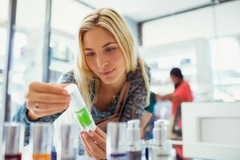France’s PFAS ban puts pressure on EU to outlaw “forever chemicals” in cosmetics

France has adopted a bill restricting the use of per- and polyfluoroalkyl substances (PFAS) in cosmetics. The legislation will take effect in 2026, prohibiting the manufacture, import, and sale of products containing PFAS in the country.
PFAS are used in cosmetics to smooth the skin and hair or influence product consistency and texture. But mounting evidence has shown their connection to thyroid dysfunction, decreased immune response, and increased cholesterol levels. Some studies suggest an association between PFAS and kidney and testicular cancers.
Safety watchdogs have urged European countries to ban “forever chemicals” from consumer goods to protect human and planetary health.

Earlier this year, multiple European environmental and health organizations wrote a letter to European Commission President Ursula von der Leyen urging her to act against “the worst pollution crisis in human history.” The organizations asked von der Leyen to ban PFAS, as she had committed to do in 2022 under the European Green Deal’s zero pollution strategy.
However, some environmentalists are not satisfied with France’s new bill. Hélène Duguy, a ClientEarth legal expert, tells Personal Care Insights that other countries need to follow suit and enact stricter measures.
“We know that a similar law is in place in Denmark, and the EU, as a whole, is now contemplating a PFAS restriction too. Given the weight of evidence against PFAS and the fact that alternatives exist, it’s imperative for top officials in Brussels and other countries to stop ‘kicking the can down the road.’ We need sweeping restrictions on PFAS for consumer and industrial uses now,” she says.
Even though Duguy believes the legislation does not cover enough industries, she still expresses that France should be “applauded” as one of the first countries to act on “what is both a public health and an environmental crisis.”
L’Oréal’s preemptive action
Multiple studies have found PFAS in personal care products such as nail polish, hair dye, and condoms. Last year, research linked the frequent use of beauty products to higher concentrations of synthetic chemicals in the blood and breast milk of people who were pregnant or breastfeeding.
 L’Oréal says it decided to stop using PFAS in 2018.To satisfy the push for consumer and environmental safety, some beauty brands have taken proactive measures to eradicate PFAS from their cosmetics products.
L’Oréal says it decided to stop using PFAS in 2018.To satisfy the push for consumer and environmental safety, some beauty brands have taken proactive measures to eradicate PFAS from their cosmetics products.
L’Oréal tells Personal Care Insights: “The cosmetics industry, as a responsible economic actor concerned about environmental issues, committed to phasing out PFAS well before regulations required it.”
“At L’Oréal, we made the decision as early as 2018 to progressively eliminate PFAS from our products. Today, 100% of our portfolio has been reformulated without PFAS.”
Attempts to derail bill
According to Le Monde, French political parties Rassemblement National and the Union des Droites pour la République tried to block the bill.
Eddy Casterman, a member of the French National Assembly, said the bill would not protect consumer health. He opposed the ban and posted on X: “The proposed law on PFAS, supported by the lobby of punitive ecology and industrial decline, will not protect the health of our compatriots, on the contrary, it will further burden our industry with new taxes and will force the French to consume ever more Chinese and Indian products made with ultra-harmful substances.”
However, Duguy at ClientEarth tells us that since the law covers the manufacture, import, export, and placing on the market of products containing PFAS, “international companies importing products into France will need to abide by this new law.”
Despite the efforts from the country’s conservative parties, the ban was passed in the Chambers of Parliament, the Assemblée Nationale, and the Sénat.













